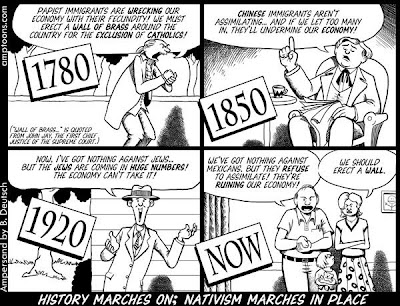
A friend from high school recently regurgitated on Facebook some xenophobic conservative drivel about illegal immigrants and I thought that rather than respond to it via mini-blog (This just in: Illegal immigrants are being vilified- Sadness consumes me. That is all) I would talk about it here, where the air isn’t so stuffy. Here’s the post in total, you may have already seen its like elsewhere:
“You pass the North Korean border illegally you get 12 yrs. hard labor, you pass the Afghan border illegally you get shot, you pass the American border illegally you get a job, driver’s license, allowance for a place to live, health care, education, billions of dollars spent so you can read a document. We carry passports in other countries or face jail time.- Repost this if you agree...”
Ug. Its difficult to know where to start. We’ll begin with a hypothetical situation:
You are busy. You know you need to mow your lawn but you just can’t find time in the week to do it. Your neighbor offers to mow it for you for a pittance. He does a pretty good job and you are paying him WAY less than you would for a landscaping service. Good deal, right? He cuts his hand while trimming your hedge so you offer him a band aid. You are being good neighbors, ja?
One day, as you wave to him from your porch you notice that he’s a little green around the gills.
“Got that bug that’s been goin’ around, neighbor?”
He nods.
“Yeah, the whole neighborhood’s gettin’ it at some point, its nasty.”
You and your family make up a nice batch of your world-famous homemade chicken noodle soup and bring it over with a half a bottle of Dimetap. You know, for his kids.
The next day you find your neighbor bright-eyed and a-mowing your lawn with verve.
Over the course of your friendship it is revealed that your friend cannot read or write in your language. He isn’t illiterate although when it comes to food packaging labels and stereo instructions he may as well be. This isn’t really surprising, heck; you spent three years in Germany and only had the most basic understanding of the language. In exchange for learning about his culture, you offer to help him learn how to read.
As a result, your neighbor is able to advise you on how to better set your sprinkler system to get healthier grass and to use less water. Nice.
He’s got some crappy cousins, but everyone has got some family members they don’t like, right? Come to think of it, you can’t swing a pool noodle at your family reunions without hitting a racist or an alcoholic or a glutton or a hypocrite or that pervy uncle that everyone hopes can’t make it this year. You accept them for who they are but you still have to remind them not to park on the lawn, its just too nice. It’s the same with your neighbor’s family: there are some you get along with and some you don’t.
If this all seems a bit simplistic, its because it really, really is. Charity doesn’t necessarily mean a free ride and not all charity comes from a place of compassion. Sometimes its born from pragmatism but often it’s a happy by-product of self interest.
I also take exception to the concept of economic protectionism. Now, don’t get me wrong, higher level economics makes my head spin but the basics seem easy enough to grasp. When you make money here selling goods and services and then spend that money here, it helps our economy by enabling others to make money and then spend it. Not all of it is going into a sock under the mattress nor is the great majority of it being sent to foreign economies. The part that is going into a foreign economy is being used for the same things it gets used for here: goods and services and living essentials. Those things are still needed no matter where the money comes from. Here are a few examples:
We cut foreign aid to the Middle East and instead of building schools and universities, they started building madrassas.
We cut aid to South America and farmers started planting poppy fields instead of the soy, corn and cotton.
After the fall of the Soviet Union, the resulting economic crisis created a breeding ground for drug cartels, slave traders and gangsters.
Contrast this with the Marshall Plan, enacted to help with European post-war recovery after WWII. It called for $13 billion in 1948 (roughly the equivalent of $119 billion in today’s money) on top of the roughly $12 billion we had already spent since the end of the war. It helped to kick-start the western European economy, but, more importantly, it gave us stable trading partners, ushered in an unprecedented era of U.S. prosperity and allowed us focus on the emerging Warsaw Pact.
People complained about Japan’s electronics and automobile industries in the 80’s and, more recently, India’s tech and biomedical industries. I swear I never understood why. Industrial competition is good for the consumer because it forces the industries to provide the same level of product for less than their competitors. It forces its competitors to innovate and improve its products in order to remain viable.
Better products at cheaper prices.
Contrast that with how industrial protectionism affected the U.S. auto industry: Virtually stagnant for 30 years, protected under the umbrella of protectionism while the rest of the world continued to innovate creating safer, more affordable, longer lasting cars. What did we get from Germany and Japan? The Passat and the Camry, two of the highest rated mid-level cars in the world. What did we get from Detroit? The Hummer H3 and the Pontiac Aztek, one vehicle aimed at the very well-off and another that rivals the AMC Gremlin in overall crappiness and both of them now discontinued.
There was an enormous uproar after Dell moved the majority of its tech support to India after the fallout of the Y2K debacle. This helped Dell cut costs which allowed them to save jobs here in the U.S., remain competitive in the volatile world of home computing and helped them to buy the specialty computer company Alienware.
Better products at cheaper prices.
Xenophobic protectionism hurts consumers and industries alike.
Trading partners with stable economies increases wealth and lowers prices.
Food, clothing, healthcare, education, gas, cars, electronics and recreation are all cheaper when your trading partner has a thriving, stable economy.
And last but not least, prosperity stops wars. When your neighbor is content and healthy, he doesn’t try to steal from you that which he cannot afford to buy. When your neighbor is happy and educated, he doesn’t turn to the loud, persuasive lunatic to help him feed his family.
Better products at cheaper prices AND increased personal and national security.
While we talk about jobs, which jobs are supposedly being stolen by the illegal immigrants? I’m what you would call a ‘low-level professional’, like many of you I have some post-high school education and training.
With that in mind, here are some of the jobs I have worked in my life:
I’ve worked the fruit fields with my immigrant mother.
I’ve worked at McDonalds.
I’ve sold specialty electronics to American servicemen in Europe.
I’ve moved furniture and then I’ve repaired furniture.
I’ve repaired computers for a major computer company.
I’ve driven a municipal bus route.
I’ve been a soldier, an EMT and a PTA (all at once, lol) and now I’m advancing my medical education in preparation for PA school.
My question is this: Which of these jobs do you think an illegal immigrant would compete with me for?
So to all of you that are frustrated and find yourselves being persuaded by the current nationalist mania, please-please remember that very, very few of us are actually native to this great country. The quote doesn't read "Give me your tired, your poor, Your huddled masses yearning to breathe free... so long as they look, sound and talk like us... unless, of course, they can hit a baseball really far." Our love of freedom and our cultural diversities are the two things that set us apart from the rest of the world. If that doesn’t give you a moments pause then consider this: The more healthy, intelligent, educated people we have working on our actual problems (i.e. disease, poverty, security, social inequity, etc.), the faster we will find solutions for them.

No comments:
Post a Comment